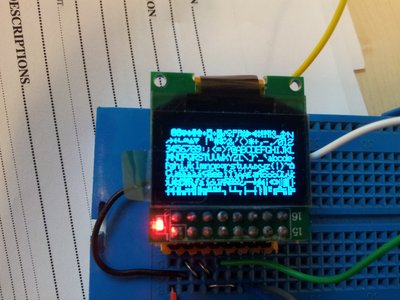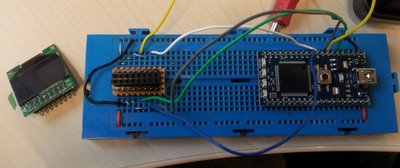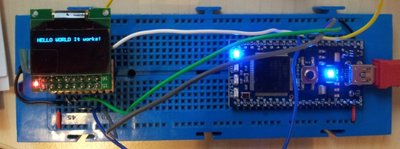SPKDisplay - A mbed display class and processing imaging tools for 128x64 OLEDs using the SSD1305 driver, connected via SPI. This variant drives a Unigraphics oled on the same driver but in page mode. Includes a simple 5x7 ascii font
Fork of spk_oled_ssd1305 by
OLED driver and demo for Univision oled display 128x64.

Modified Toby Harris' code to run page mode addressing in 4 wire SPI on the Univision UG-2864HSWEG01 128X64 unit - often found for sale on ebay. That's where I got mine anyhow.
Wiring this was fairly straightforward but you really do have to ground all the unused pins EXCEPT for number 8 to get it to work.
Here's the layout - I made a little carrier using a 2x8 connector and a couple of headers mounted on a small piece of stripboard. You can see all the wire links that are used to ground the unused pins. It was pretty awkward setting the display to run in 4 wire spi - had to desolder and resolder three smd o ohm links on the back o fhte pcb - ended up using a microscope to see them.

Here is the output of the demo code.

In page mode the display is effectively divided up into 8 horizontal strips, each 8 pixels high so lends itself nicley to displaying text in a 5x7 font. I've included the 5x7 lcd font in the code below.
Code
Import programunivision_oled
driver demo for univision oled dispaly
#include "mbed.h"
#include "4spi_oled_ssd1305.h"
/* re writtten to cope with teh ssd1306 driven oled UG-2864HSWEG01 from univision
wiring for test circuit
OLED pins -FUNCTION-------MBED PINns
1 ----3.3V--- Vout (p40)
2 ----0.0V--- GND (p1)
3 ----------- GND (p1)
4 ----------- GND (p1)
5 ----------- GND (p1)
6 ----------- GND (p1)
7 ----------- GND (p1)
8 ----------- N/C
9 ----D1---- mosi (p5)
10 ---D0------sck(p7)
11 ----------- GND (p1)
12 ----------- GND (p1)
13 ---DC------ p10
14 ---RES----- p9
15 ---CS------ p8
*/
DigitalOut myled(LED1);
// Create object and load font
//SPKDisplay( mosiPin, clkPin, csPin, dcPin, resPin, Serial *debugSerial)
SPKDisplay screen(p5, p7, p8, p10, p9);
int main()
{
char msg[22];
sprintf(msg," ");
// 01234567890abcdefghij
int i=0;
while(1==1) {
myled=1;
// nice logo output
screen.welcome();
wait(3);
wait(2);
for(i=0; i<5; i++) {
myled=0;
screen.inverse();
wait(1);
screen.normal();
myled=1;
wait(1);
}
screen.fontdemo();
myled=0;
wait(5);
screen.clearBuffer();
screen.sendBuffer();
myled=1;
wait(0.5);
myled=0;
wait(0.5);
for(i=0; i<8; i++) {
sprintf(msg,"HELLO WORLD %d",i);
screen.textToBuffer(msg, i);
screen.sendBuffer();
screen.clearBuffer();
myled=1;
wait(1);
}
}
}
Diff: spk_oled_ssd1305.cpp
- Revision:
- 1:dd3faa2ab1dd
- Parent:
- 0:76bb084fa033
- Child:
- 3:ade83210ecf6
diff -r 76bb084fa033 -r dd3faa2ab1dd spk_oled_ssd1305.cpp
--- a/spk_oled_ssd1305.cpp Sun Apr 15 16:51:01 2012 +0000
+++ b/spk_oled_ssd1305.cpp Sun Apr 15 19:39:17 2012 +0000
@@ -1,7 +1,7 @@
// *spark audio-visual
// OLED display using SSD1305 driver
// Copyright *spark audio-visual 2012
-
+
#include "spk_oled_ssd1305.h"
#include "mbed.h"
@@ -9,6 +9,10 @@
{
bufferHasChanged = false;
+ fontStartCharacter = NULL;
+ fontEndCharacter = NULL;
+ fontCharacters = NULL;
+
spi = new SPI(mosiPin, NC, clkPin);
spi->format(8,3);
spi->frequency(2000000);
@@ -34,7 +38,7 @@
bufferHasChanged = true;
}
-void SPKDisplay::imageToBuffer()
+void SPKDisplay::imageToBuffer(const uint8_t* image)
{
memcpy(buffer, image, bufferCount);
bufferHasChanged = true;
@@ -84,6 +88,10 @@
void SPKDisplay::textToBuffer(std::string message, int row)
{
+ // Font check
+ if (NULL == fontCharacters) return;
+ if (NULL == fontStartCharacter || NULL == fontEndCharacter) return;
+
// Range check
if (row >= 8) row = 7;
int bStart = row*bufferWidth;
@@ -95,7 +103,7 @@
char character = message.at(i);
// Is it outside the range we have glyphs for?
- if ((character < characterBytesStartChar) || (character > characterBytesEndChar))
+ if ((character < *fontStartCharacter) || (character > *fontEndCharacter))
{
// Treat as a space
for (int j = 0; j < 5; j++)
@@ -114,13 +122,13 @@
else
{
// Shift into our array's indexing
- character -= characterBytesStartChar;
+ character -= *fontStartCharacter;
// Write each byte's vertical column of 8bits into the buffer.
- for (int j = 0; j < characterBytes[character][0]; j++)
+ for (int j = 0; j < fontCharacters[character][0]; j++)
{
if (bPos >= bEnd) break;
- buffer[bPos++] = characterBytes[character][j+1];
+ buffer[bPos++] = fontCharacters[character][j+1];
}
// Put 1px letter spacing at end

